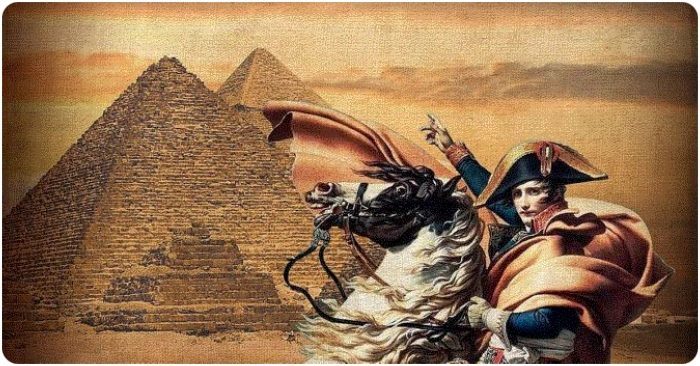
Napoleon was an outstanding French military and politician. He had a mystical experience in the Great Pyramid of Giza. Confidential people asked him what happened in there. “Even if I tell people, people won’t believe me,” he replied. This miraculous experience may have changed his destiny as well as the history of the world.
Napoleon made history in Egypt
In the summer of 1798, by order of Napoleon, more than 30,000 French soldiers arrived in Egypt. Their mission was to liberate the countries on the banks of the Nile that had been ruled by Turkey for three centuries; at the same time preventing free sea traffic between Great Britain and the Eastern colonies.
Napoleon also brought over 100 scholars of different disciplines to study, documenting everything about this land: temples, tombs, mummies, tunnels, treasures and of course the Pyramids.
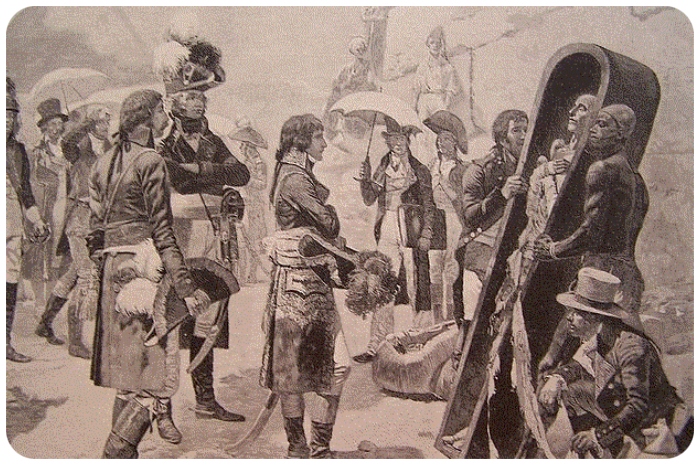
Napoleon and his delegation to explore the Egyptian Pyramids (photo: Quantrimang)
It was Napoleon’s scientific and military expedition that allowed the European continent to open up the treasures, as well as unsolved mysteries, that the ancient Egyptians left behind thousands of years ago.
At that time, one of Napoleon’s soldiers while digging a ditch at the medieval fortress of Ratched, stumbled across an important piece of art in ancient Egyptian history, the “Stone Slab.” Rosetta” – helped scholars decipher Egyptian hieroglyphs.
There are three types of writing inscribed on the Rosetta Stone: hieroglyphs, common Egyptian and Greek. From the Greek texts, the researchers eventually found the corresponding meaning in the hieroglyphs, and set up a decoder to read other ancient Egyptian texts.
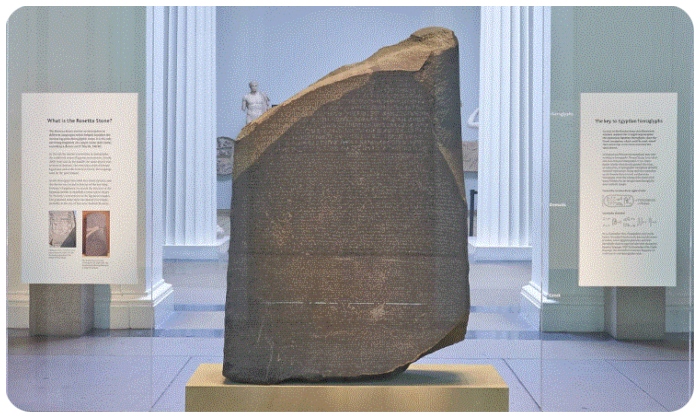 Rosetta stone is considered the key of ancient Egyptian civilization (photo: Tinhte)
Rosetta stone is considered the key of ancient Egyptian civilization (photo: Tinhte)
Napoleon’s expedition set off on April 14, 1799, and returned to Cairo in August of the same year, when he decided to sleep in the Great Pyramid of Giza. He slept next to the pharaoh’s tomb, which was difficult to enter because the passage was very narrow, the height was less than half a meter, the light could not enter, the level of complexity was beyond imagination.
Napoleon spent the night in the Great Pyramid
The Pharaoh’s Tomb or King’s Chamber is located inside the Great Pyramid of Giza. It was a rectangular room about 10 meters long and 5 meters wide, including granite countertops; on the walls and ceiling there was no decoration at all, only an empty granite coffin. It is not understood how the stone coffin could be here, because the passage is too narrow to transport such a large object.
Napoleon was a brave general on the battlefield, but after only a night of sleep in the Pyramids, he returned with a pale face from panic.
Later, when dying, some of his confidants asked him what had happened in the Pyramids, to which Napoleon replied: “Even if I told you, it wouldn’t help, you wouldn’t believe me.” . And he carried that secret to the grave.
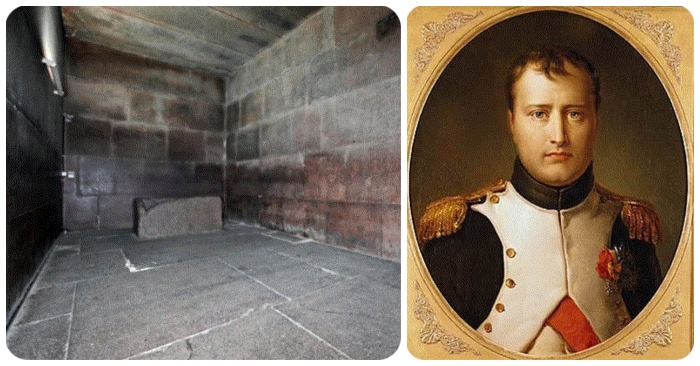
The king’s room where Napoleon spent the night (photo: Wikipedia)
It is believed that it was the night of sleeping in the king’s room that changed the outlook as well as the life of this talented military man. After returning to France, he defeated the enemy and quickly won over the next few months. Napoleon succeeded in the French Revolution and established a National Assembly headed by himself.
Many people have theorized that Napoleon most likely saw his future in that room. But it’s all just conjecture.
In his classic book “The Secret of the Great Pyramid” , Peter Tompkins wrote: “Napoleon really wanted to stay alone in the Pyramid just like Alexander the Great had done before.”
During his lifetime, he was fascinated by a number of other great historical figures. He always tried to follow in the footsteps of Alexander the Great and Julius Caesar, who also spent the night alone in the Pyramids trying to find meaning in life beyond survival.
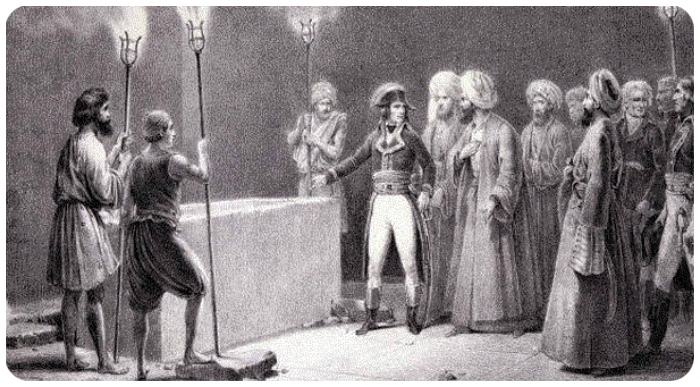
Napoleon in the king’s room (photo: Truyenhinhvov)
Sadly, whatever Napoleon experienced in the Great Pyramid, remains a secret no one knows. However, many legends have been put forward, one of which is that Napoleon saw some illusion, he saw himself become the greatest emperor on Earth.
Spending a night inside the Pyramids is unthinkable. For most people, spending the night on a giant rock is a completely crazy idea. Just the sound of breathing can turn into a horrible noise. However, Napoleon was not the only one who dared to do so.
Mystical vision inside the king’s room
The mystic Aleister Crowley wrote in his autobiography: “The Pharaoh’s Tomb was as bright as the brightest moonlight in the equator. The faint yellow candle seemed to disrespect God, so I extinguished the candle. In the morning, the light of the tomb has completely disappeared, the only sound that can be heard is the sound of bats flapping their wings.”
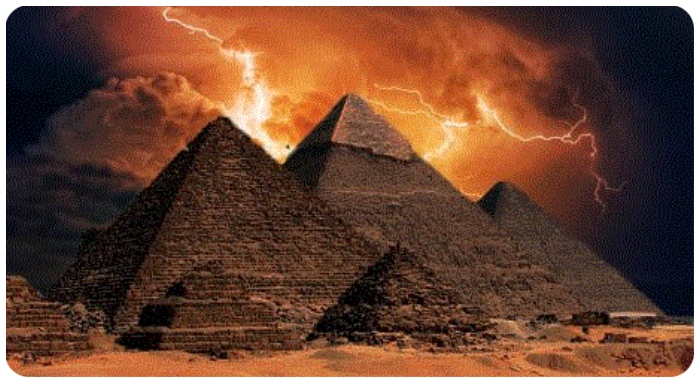
Irregularity in the Great Pyramid (photo: Danviet)
Other people who have been inside the Great Pyramid have also reported seeing strange sights. In 1930, British theologian Paul Brenton saw something strange during his brief stay at the Pharaoh’s Tomb in the Great Pyramid. He said: “…it was like being attacked by evil creatures and surrounded by monstrous forms that looked like demons…”
He also spent a night inside the “King Room”. Then described his experience in the famous book titled “A Search in Secret Egypt”.
The “king room” is made of granite. That night he sat on a granite slab and lit a small candle. Only silence enveloped him, he could see ghosts lurking. He was terrified but determined to stay there, and before long the ghosts disappeared, but were followed by something even more terrifying.
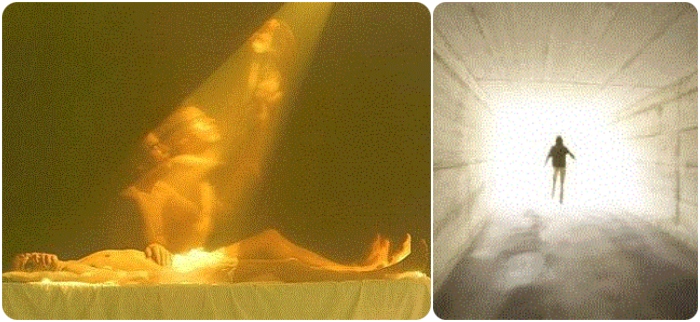
(photo: Kimtuthap)
Paul Brenton felt his body go numb, he saw a number of people dressed in ceremonial clothes that looked like priests. These ghosts lead him to a secret room inside the Pyramid, which is known as the learning hall.
He felt his soul leave his body and enter a dimension beyond death. What he describes is called an out-of-body experience. He said he could see a silver wire connecting his “lifeless” body to his soul floating in the Pyramid.
He saw his body lying motionless on the floor. While, the ancient “guides” told him about the pyramid was built at the time of the great civilization of Atlantis.
In addition, he was told about secrets, including secret chambers inside the Pyramids. And suddenly he realized he was alive again. He claimed that he was introduced to the Pyramids by the priests still living there.
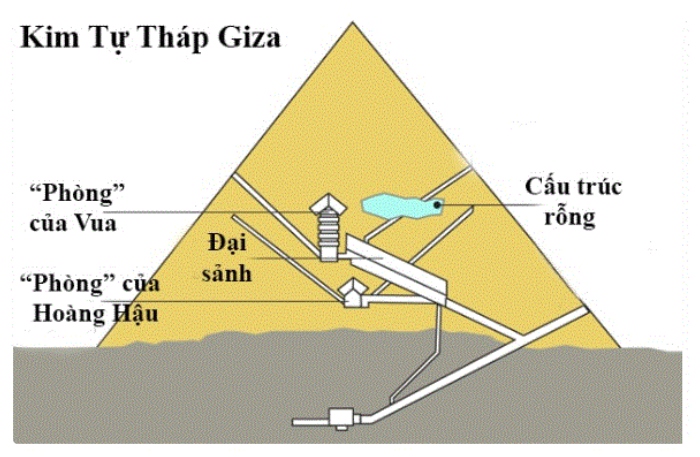
(photo: Vjsonline)
Experts in occultism argue that these priests did not live there. They only came to prove to people that there is life after death; that the human soul exists. When we die, the physical body will decay, but the soul will live forever.
What led to the mystical experience at the Great Pyramid?
The researchers say that the granite blocks in the tomb can conduct electricity. Because most granite contains a relatively high content of quartz crystals, and quartz is piezoelectric. In fact, all conductive objects we know today are composed of quartz. The ancient architects who built the Pyramids must have known about the conductivity of quartz and they used it intentionally.
Electromagnetic properties in the tombs of the pharaohs
A tourist while drinking water from a metal thermos, one of his hands touched the Pyramid and he was shocked. Studies have also found that, when people enter the Great Pyramid, the batteries of cameras and various research equipment are inexplicably damaged.

Electric ball simulated on ancient Egyptian sculpture (photo: Kimtuthap)
Can this unusual electromagnetic phenomenon explain the mysterious phenomena and experiences many people have seen in the Pyramids? And do these prove that the Great Pyramid of Giza is not a mausoleum, as many mainstream scholars assume?
There is also a theory that tries to explain the “force” inside the Great Pyramid, that the shape makes it possible to focus cosmic energy, if placing the pharaoh’s body in the center of the pyramid can be help preserve the body.
However, none of the three pyramids at Giza contain mummies. This led many researchers to hypothesize that the pyramids were not tombs but large energy machines.








